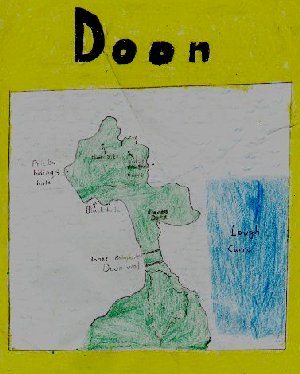
Our
exploration of Doon has featured on the Intel Odyssey Site, a website
which features computer project work from around the world.
We were awarded a digital microscope for our participation.
You can check out
the site at this address:
www97.intel.com/education/odyssey/day_061/day_061.htm
On the right is a map of the Doon Peninsula as drawn by Daiví. It sticks out into Lough Carra.

This is part of the Iron Age rampart which protected the inhabitants of the peninsula.
When Doon was under attack, the soldiers used two walls so the attackers couldn't get in. The walls were very very powerful. If the first wall was overrun, the attackers had to get past the second wall. There was a tunnel that a priest used to hide in.
Earnán
Seo Rang 4 leis an gclann Quinn roimh an turas.
Ag siúl
sa choill
Doon peninsula is an interesting place. We learned quite a lot of things about the peninsula. For instance, I learned how deep the water is in the black hole. That was 60 feet deep, and we learned lots of other things also. The peninsula had lots of wildlife and trees and flowers. I liked going through the trees because it felt like you were in a jungle.
Éabha Ní Gharbháin.
There are lovely views of Lough Carra
Doon is situated
Burriscarra, Clogher, Claremorris Co. Mayo about 10 miles away from
Castlebar. We visited it to learn about our heritage and history.
Doon peninsula is on Lough Carra. It is a historic site dating back
to the bronze age. People lived here 2000 years ago. People lived in
huts 2000 years ago. The huts were made with hazel coppice, daub and
thatch. The water looks green in Lough Carra becausa it is a limestone
region and the lake has a sandy bottom. This sand is known as marl.
Ide
Féileachán
Frog
Ag teacht
amach ón bpluais.
During the Irish War of Independence mass was cancelled, so the priest in Doon hid in the cave formed in the iceage.
Is áit álainn í loch Carra. Tá gaineamh ag bun an locha. 'Marl' an t-ainm thugtar air. Tugann sé dath glas don t-uisce. Tá bunús aolchloch san áit seo. Fásann giolcaigh san uisce. Tá an cré go maith agus is féidir linn a lán crann a fheiceáil ar an leithinis. Tháinig na Normannaigh, na Manaigh agus na Sasanaigh anseo mar tá an talamh go maith agus is féidir le daoine dul timpeall na haíte go héasca i mbád.
Risteard
Le Ruth sa loch.
Cillian
Seo ceann de na crannóga a rinneamar sa rang. Bhí na tithe, ina raibh na feirmeoirí ina gcónaí ar an leithinis, déanta sa bhealach céanna.
Doon's history goes
back 2000 years. There is a strong rampart that protected the peninsula
from other invading tribes. The rampart in Doon is 130m long and the
defending troops were heavily equipped. If an intruder got past the
first rampart there is a second rampart that is even higher than the
first rampart.
Lorcán
